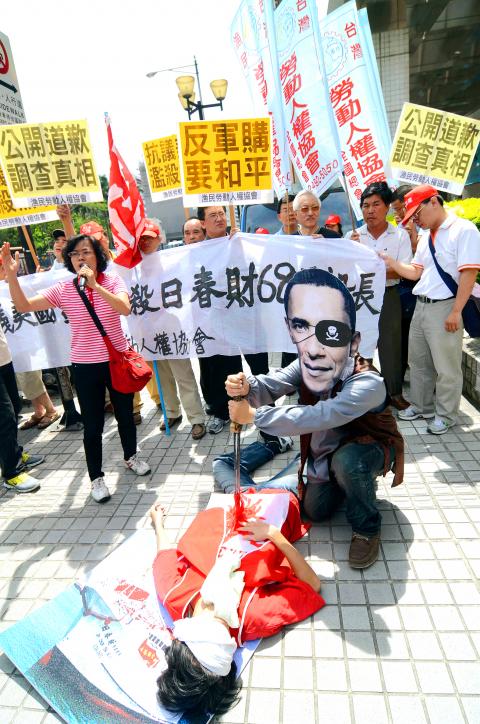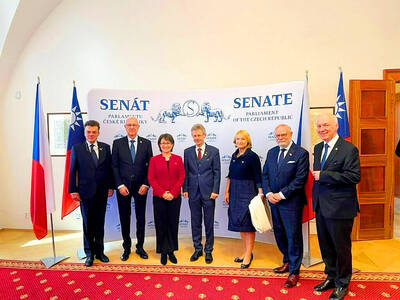A small group of people protested in front of the American Institute in Taiwan (AIT) yesterday, demanding that the truth about the death of a Taiwanese ship captain during a firefight between a US Navy ship and Somali pirates be made public and that the US compensate the captain’s family.
Wu Lai-yu (吳來于), captain of the Jih Chun Tsai No. 68, which was hijacked by pirates off the coast of Somalia in March last year and was used as a mothership, died on May 10 during a NATO anti-piracy mission carried out by the USS Stephen W. Groves.
Washington has yet to account for how the gunfight began and how Wu was killed, only saying that a team from the US warship found Wu and three pirates dead when it boarded the vessel. The US also confirmed that Wu was buried at sea.

Photo: Wang Yi-sung, Taipei Times
Dozens of protesters representing the Human Rights Association for Taiwan Fishermen, the Labor Party and the Chung Hwa Baodiao Alliance protested to condemn the US for “killing the captain” and “destroying the corpse and obliterating the evidence.”
“The US hasn’t offered an apology, nor has it made any mention of compensation, which is why we are here today,” Labor Party -Secretary-General Tang Shu (唐曙) said.
Tang said Wu “was not killed by mistake,” but that it was a case of “an innocent civilian -slaughtered” by the US Navy, an act Tang said was “in violation of the principles for humanitarian rescue operations.”
“It’s outrageous that the US brazenly killed a hostage in international waters,” Tang said.
The protesters demanded the US publicly apologize to Wu’s family, provide compensation for losses — including Wu’s death and the sinking of the ship — and that the US allow Taiwanese officials to participate in an investigation into the accident.
A final request was that the US urge Japan to grant Taiwanese fishing rights in the disputed Diaoyutai Islands (釣魚台).
“It was because Japan prevented Taiwanese fishermen from operating in the waters surrounding the Diaoyutai Islands that Wu had sailed a long way to dangerous waters off eastern Africa to earn a living,” Human Rights Association for Taiwan Fishermen director Hsiao Wen-yi (蕭文義) said.
US support for Japan’s claim to the Diaoyutai Islands and the inclusion of the disputed waters in the Treaty of Mutual Cooperation and Security between the US and Japan has resulted in Japan’s arbitrary denial of Taiwanese fishermen’s right to operate there, Hsiao said.
The protest lasted about an hour, with demonstrators chanting slogans and delivering statements to AIT spokesperson Sheila Paskman, who came out to receive them.
Talking to representatives of the groups, Paskman said the AIT was aware that the matter was important and needed to be resolved.
Paskman said the AIT would contact the Ministry of Foreign Affairs as soon as it obtained new information about the incident from the US government.
Ecoterra International, an international NGO, said that on April 24, the USS Stephen W. Groves, operating as part of NATO’s counter-piracy mission, had fired upon and destroyed two unmanned pirate skiffs towed by the Jih Chun Tsai No. 68 while it was attached to the hijacked Italian bulker Rosalia’s Amato.
The military action by the US Navy has been described by Ecoterro as an “ill-conceived” and “botched” naval attack because it “endangered hostages in the first place” and was not followed by legal procedures to try the surviving pirates, whom NATO said in a statement have been returned to Somalia.
Also cast into doubt by Ecoterro was whether the US Navy was authorized to attack the pirate convoy.
“While trying to get information if the US naval attack against this pirated convoy was authorized by the vessel owner and/or the Italian government, we received first reports which clearly indicate that neither the Italian government nor the vessel owner had authorized any military action and as a matter of fact the navies were only requested to observe the vessel while it was commandeered to Somalia. Apparently the navies and especially NATO have been given firm instructions to stand down and to not wage any military action,” Ecoterro reported on May 20.
In an e-mail reply to the Taipei Times regarding the operation, AIT spokesperson Christopher Kavanagh said: “All at-sea counter-piracy engagements are designed to avoid casualties. We do not, however, discuss the details of specific counter-piracy operations.”
“Under international law, all states, including the United States, have a duty to cooperate in repressing piracy. Generally, a warship has the right under international law to board any vessel reasonably suspected of engaging in piracy,” Kavanagh said.
He said the US Department of Defense was undergoing a “factual review” of the circumstances surrounding Wu’s death.
The AIT provided some additional information about the Jih Chun Tsai No. 68 and Wu to the ministry over the weekend, he said.
“As we receive more details, we will share them with the Ministry of Foreign Affairs,” he said.
Bruce Linghu (令狐榮達), the director-general of the ministry’s Department of North American Affairs, confirmed to the Taipei Times that the AIT had provided more information to the ministry, but that it was not a final investigation report.

FREEDOM OF NAVIGATION: The UK would continue to reinforce ties with Taiwan ‘in a wide range of areas’ as a part of a ‘strong unofficial relationship,’ a paper said The UK plans to conduct more freedom of navigation operations in the Taiwan Strait and the South China Sea, British Secretary of State for Foreign, Commonwealth and Development Affairs David Lammy told the British House of Commons on Tuesday. British Member of Parliament Desmond Swayne said that the Royal Navy’s HMS Spey had passed through the Taiwan Strait “in pursuit of vital international freedom of navigation in the South China Sea.” Swayne asked Lammy whether he agreed that it was “proper and lawful” to do so, and if the UK would continue to carry out similar operations. Lammy replied “yes” to both questions. The

Two US House of Representatives committees yesterday condemned China’s attempt to orchestrate a crash involving Vice President Hsiao Bi-khim’s (蕭美琴) car when she visited the Czech Republic last year as vice president-elect. Czech local media in March last year reported that a Chinese diplomat had run a red light while following Hsiao’s car from the airport, and Czech intelligence last week told local media that Chinese diplomats and agents had also planned to stage a demonstrative car collision. Hsiao on Saturday shared a Reuters news report on the incident through her account on social media platform X and wrote: “I

SHIFT PRIORITIES: The US should first help Taiwan respond to actions China is already taking, instead of focusing too heavily on deterring a large-scale invasion, an expert said US Air Force leaders on Thursday voiced concerns about the Chinese People’s Liberation Army’s (PLA) missile capabilities and its development of a “kill web,” and said that the US Department of Defense’s budget request for next year prioritizes bolstering defenses in the Indo-Pacific region due to the increasing threat posed by China. US experts said that a full-scale Chinese invasion of Taiwan is risky and unlikely, with Beijing more likely to pursue coercive tactics such as political warfare or blockades to achieve its goals. Senior air force and US Space Force leaders, including US Secretary of the Air Force Troy Meink and

Czech officials have confirmed that Chinese agents surveilled Vice President Hsiao Bi-khim (蕭美琴) during her visit to Prague in March 2024 and planned a collision with her car as part of an “unprecedented” provocation by Beijing in Europe. Czech Military Intelligence learned that their Chinese counterparts attempted to create conditions to carry out a demonstrative incident involving Hsiao, which “did not go beyond the preparation stage,” agency director Petr Bartovsky told Czech Radio in a report yesterday. In addition, a Chinese diplomat ran a red light to maintain surveillance of the Taiwanese